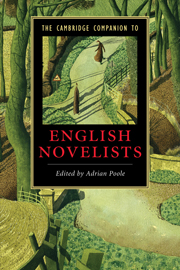Book contents
- Frontmatter
- Introduction
- 1 Daniel Defoe
- 2 Samuel Richardson
- 3 Henry Fielding
- 4 Laurence Sterne
- 5 Frances Burney
- 6 Jane Austen
- 7 Walter Scott
- 8 Charles Dickens
- 9 William Makepeace Thackeray
- 10 Charlotte Brontë
- 11 Emily Brontë
- 12 Elizabeth Gaskell
- 13 Anthony Trollope
- 14 George Eliot
- 15 Thomas Hardy
- 16 Robert Louis Stevenson
- 17 Henry James
- 18 Joseph Conrad
- 19 D. H. Lawrence
- 20 James Joyce
- 21 E. M. Forster
- 22 Virginia Woolf
- 23 Elizabeth Bowen
- 24 Henry Green
- 25 Evelyn Waugh
- 26 Graham Greene
- 27 William Golding
- Guide to further reading
- Index
16 - Robert Louis Stevenson
Published online by Cambridge University Press: 28 March 2010
- Frontmatter
- Introduction
- 1 Daniel Defoe
- 2 Samuel Richardson
- 3 Henry Fielding
- 4 Laurence Sterne
- 5 Frances Burney
- 6 Jane Austen
- 7 Walter Scott
- 8 Charles Dickens
- 9 William Makepeace Thackeray
- 10 Charlotte Brontë
- 11 Emily Brontë
- 12 Elizabeth Gaskell
- 13 Anthony Trollope
- 14 George Eliot
- 15 Thomas Hardy
- 16 Robert Louis Stevenson
- 17 Henry James
- 18 Joseph Conrad
- 19 D. H. Lawrence
- 20 James Joyce
- 21 E. M. Forster
- 22 Virginia Woolf
- 23 Elizabeth Bowen
- 24 Henry Green
- 25 Evelyn Waugh
- 26 Graham Greene
- 27 William Golding
- Guide to further reading
- Index
Summary
In a volume entitled, at once defiantly and wistfully, I Can Remember Robert Louis Stevenson, Flora Masson recalls a dinner party at the Stevensons' family home in Edinburgh, sometime in the 1870s. The twenty-something Louis, as he was known to family and friends, was enthusing about Balzac, his style and vocabulary. This set off a heated debate between father and son about language. “Mr Stevenson upheld the orthodox doctrine of a 'well of English undefiled', which of course made Louis Stevenson rattle off with extraordinary ingenuity whole sentences composed of words of foreign origin taken into our language from all parts of the world - words of the East, of classical Europe, of the West Indies, and modern American slang . . . It was a real feat in the handling of language, and I can see to this day his look of pale triumph.” / Mr Stevenson was prosperous, pious, an eminent lighthouse engineer. He had hoped his only child would follow the family profession or become a lawyer, but young Louis recoiled from respectability. He was sickly, volatile, mutinous, hungry for play, performance, sensation. After his early death in 1894, his friend Henry James declared 'the filial relation quite classically troubled'. In this duel over language the son roams the globe. Like his own immediate literary father, Walter Scott, Stevenson drew to fine effect on the variations between Scots and English, in Kidnapped (1886) and the unfinished Weir of Hermiston (1896), as well as in shorter tales such as 'Thrawn Janet' and 'The Merry Men' (both 1881).
- Type
- Chapter
- Information
- The Cambridge Companion to English Novelists , pp. 258 - 271Publisher: Cambridge University PressPrint publication year: 2009
- 1
- Cited by



